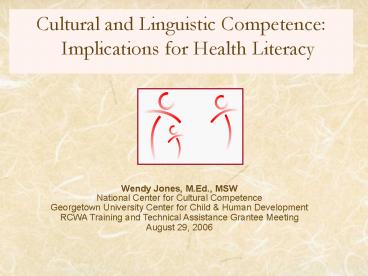Cultural and Linguistic Competence: Implications for Health Literacy - PowerPoint PPT Presentation
1 / 8
Title:
Cultural and Linguistic Competence: Implications for Health Literacy
Description:
engage in self-assessment. acquire cultural knowledge & skills ... Assist in learning to self-advocate. Slide Source: National Center for Cultural Competence, 2006 ... – PowerPoint PPT presentation
Number of Views:72
Avg rating:3.0/5.0
Title: Cultural and Linguistic Competence: Implications for Health Literacy
1
- Cultural and Linguistic CompetenceImplications
for Health Literacy
Wendy Jones, M.Ed., MSW National Center for
Cultural Competence Georgetown University Center
for Child Human Development RCWA Training and
Technical Assistance Grantee Meeting August 29,
2006
2
Cultural Competence
requires that organizations have a defined set of
values and principles, and demonstrate behaviors,
attitudes, policies, structures, and practices
that enable them to work effectively
cross-culturally
(adapted from from Cross, Bazron, Dennis and
Isaacs, 1989)
Slide Source The National Center for Cultural
Competence, 2004
3
Five Elements of Cultural Competence
Individual Level
- acknowledge cultural differences
- understand your own culture
- engage in self-assessment
- acquire cultural knowledge skills
- view behavior within a cultural context
(modified Cross, Bazron, Dennis and Isaacs, 1989)
Slide Source The National Center for Cultural
Competence, 2006
4
Cultural Competence Continuum
(Cross, Bazron, Dennis and Isaacs, 1989)
CulturalProficiency
CulturalCompetence
CulturalPre-Competence
Cultural Blindness
CulturalIncapacity
Cultural Destructiveness
Slide Source National Center for Cultural
Competence, 2006
5
Linguistic Competence
- is the capacity of an organization and its
personnel to communicate effectively, and convey
information in a manner that is easily understood
by diverse audiences including persons of limited
English proficiency, those who are not literate
or have low literacy skills, and individuals with
disabilities - requires organizational and provider capacity
to respond effectively to the health literacy
needs of - populations served
- insures policy, structures, practices,
procedures and dedicated resources to
support this capacity
Goode Jones, Revised 2005, National Center
for Cultural Competence
Slide Source National Center for Cultural
Competence, 2006
6
Literacy Expectations in Health Care
- Access information
- Recognize cues to action
- Access care
- Navigate institutions
- Complete forms
- Provide consent
- Communicate with professionals
- Provide information for assessment, diagnosis
treatment - Understand directions
- Follow regimens
- Advocate
DATA SOURCE Rudd, R.E. (2003) Empowering
Disadvantaged Populations. electronic slide
presentation Retrieved 7/22/05, from Harvard
School of Public Health, Health Literacy Studies
Web site
Slide Source National Center for Cultural
Competence, 2006
7
Addressing Cross Cultural Challenges
- Individualizing communication
- Using appropriate health education strategies to
elicit information for assessment, diagnosis
treatment - Model, demonstrate, use symbols while orally
explaining directions/regimens - Assist in learning to self-advocate
- Managing short visits
- Providing accessible information
- Providing care w/in a cultural context
- Making systems and facilities accessible
- Client friendly paperwork
- Explaining consent in a meaningful way
Slide Source National Center for Cultural
Competence, 2006
8
INTEGRALLY LINKED Pieces of the Same Puzzle
T.D. Goode
Slide Source National Center for Cultural
Competence, 2006































